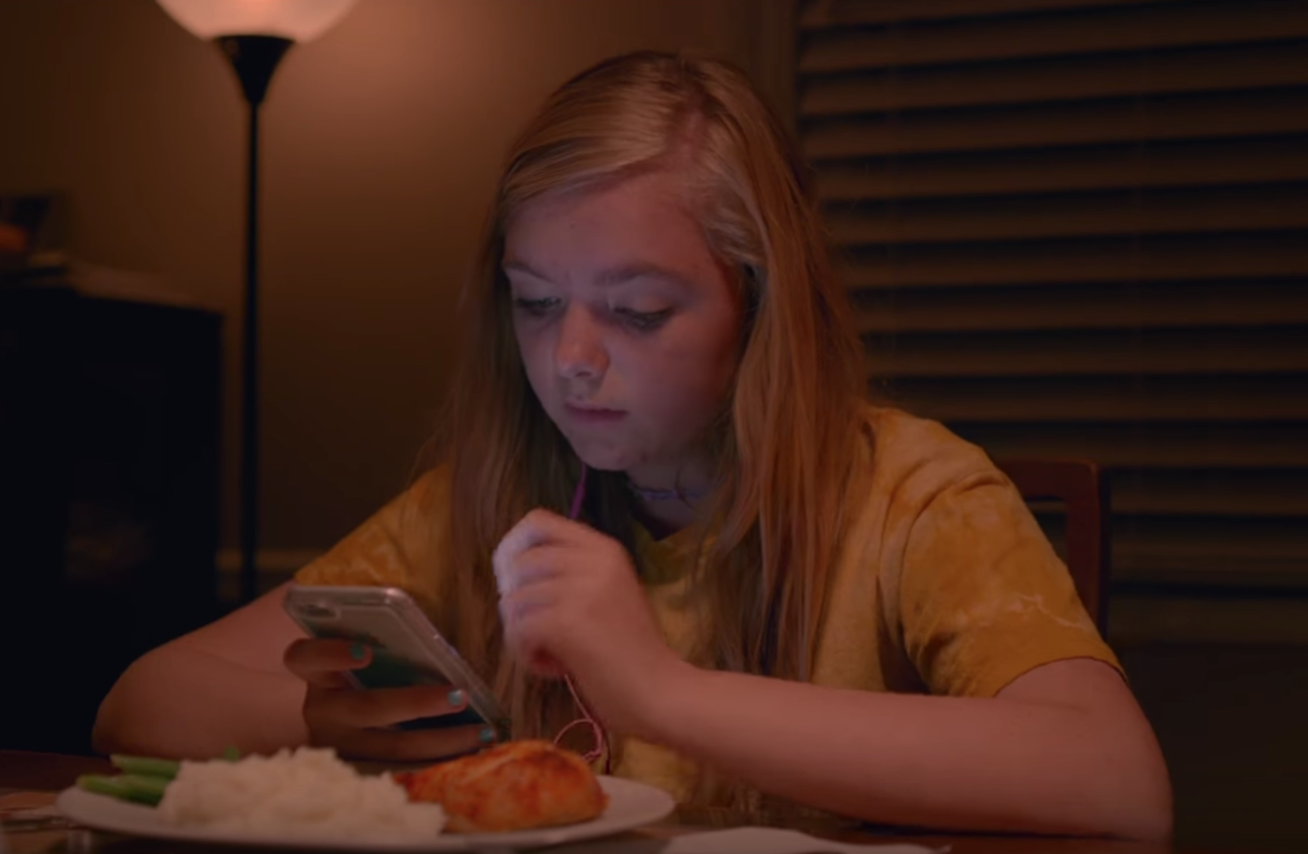In his book Notes on the Cinematographer, French filmmaker Robert Bresson wrote about the role of “looks” and the human face as an object in film. Bresson often used non-actors in his films (“working models, taken from life”) and theorized about the blurring of “acting” with capturing an unaffected human essence. These days, his theories pop to mind when watching films that portray modern characters realistically interacting with social media and smartphones.
These private checkups take up a hefty chunk of the average person’s day, and it feels increasingly remiss for filmmakers to avoid representing them. However, on some level, these moments seem inherently non-cinematic or non-dramatic. Directors normally have only two things at their disposal to illustrate the stakes of a scene: a screen and the face gazing at it. Realistically, a character might process what she’s seeing internally, without signaling strong feeling on her face. The best performances in these scenarios, then, come when the actors eschew athletic “acting” and instead just transmit what Bresson cryptically calls “the thing that matters…what they hide from me and, above all, what they do not suspect is in them.”
Eighth Grade, the debut film by 28-year-old comedian Bo Burnham, is an unexpected triumph, in part because of the unusual verisimilitude it displays in these sorts of scenes. Kayla (Elsie Fisher), Burnham’s 13-year-old vlogger protagonist, does not live her life entirely online—far from it—but social media represents a much larger chunk of her daily experience than we’re used to seeing on film. Recalling Bresson’s concept of an actor’s character being “enclosed in [their] mysterious appearance,” Eighth Grade’s most impressive achievement is the emotional charge Fisher delivers even when she’s simply staring into the glow.
One especially potent sequence shows Kayla scrutinizing her social media feeds to deafening playback of Enya’s new age pop classic “Orinoco Flow.” Kayla’s face is both blank and rapt as the vortex sucks her in, filled with selfies, non-sequitur GIFs, and emoji-studded Twitter takes. Humor emerges in other scenes when her affable single father Mark (Josh Hamilton) makes nerdy-charming attempts to corral her attention away. Kayla’s indignance in response is revelatory: an unforced portrayal of the quixotic urges for independence and “space” that plague so many chronically anxious teenagers.
It would be easy for Eighth Grade to use Kayla’s textbook-unhealthy social media consumption to teach an easily digestible lesson. But Burnham’s script doesn’t pretend like it would be reasonably possible, or even necessarily beneficial, for Kayla to abandon all of her online habits in some righteous purge. Her relationship with technology does change eventually, but only as she proactively tries out new approaches to the rest of her life, or is forced into catharsis. When she plays an uncomfortable game of truth or dare with a high school boy, the film evokes the traumatic significance of coercive, sexually charged interactions. Though the weight may be difficult to describe to others, it carries seismic importance for the victim.
After this, Kayla’s online presence is no longer so sunny and conciliatory, and she makes important changes to the company she aspires to keep while offline. An only slightly too long, slightly too heroic monologue from Dad hammers home an overarching point: be yourself, and don’t let the bastards get you down—or at least, keep the bastards in some kind of perspective. Now is not forever, but Burnham’s invasive camera and Anna Meredith’s playfully punishing electronic score help us sense how Kayla perceives it as such.
Fisher’s face, however, gives the truest illustration of Kayla’s arc, channeling pre-adolescent tics that have rarely been so honestly or poignantly showcased in film. Watch her averted eyes during her otherwise triumphant telling-off of a quintessential popular girl, her sorrowful looks as she plays back a recorded message from her sixth-grade self, and her ravenous attention during a trip to the mall with older kids. As Eighth Grade winds down, it is clear that Kayla has not fully emerged as a butterfly from some preteen cocoon. Her manner of speaking is still beautifully elliptical and redundant; she hasn’t yet figured out the perfect ways to conduct or express herself. If anything, the world is becoming even more confusing than it was in middle school. But a new drift toward a more adult self-awareness has begun.
Perhaps Kayla is coming to terms with the idea of being a smaller fish in life’s big pond, or contemplating the possibility that there are many different pathways to self-realization and contentment. She realizes that bifurcating her identity into online and IRL selves does not help her—and tells us about it, naturally, in a YouTube video. The more things change…and so on. The internet, like middle school, can feel like a crazy and sadistic rollercoaster (or as Kayla puts it, like the apprehensive feeling before you get on one). Eighth Grade, thanks largely to Elsie Fisher and her natural command of the frame, illustrates the challenges of both with breathtaking humility.




